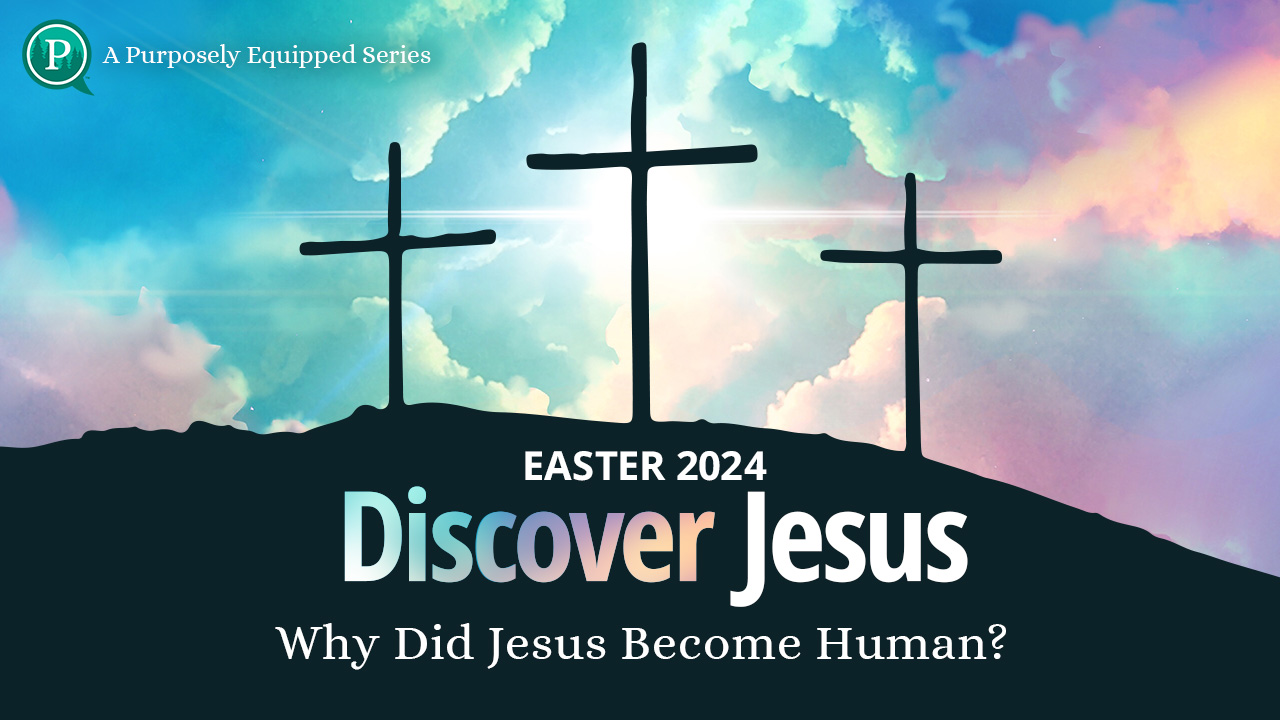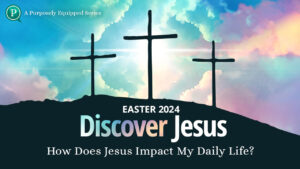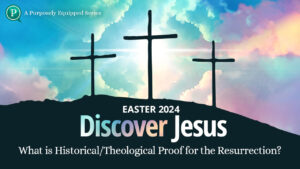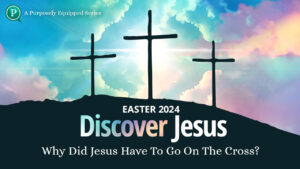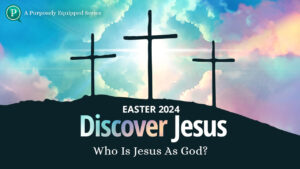Pastor Wyatt Martin from Alderwood Community Church joins Mark Holland on episode one of the Discover Jesus series to discuss the humanity of Jesus. Jesus being fully human and divine allowed him to sympathize with human weaknesses, serving as a mediator and high priest. Understanding Jesus’ humanity is vital for Christians, offering hope and guidance.
Show Notes:
Transcription:
Mark Holland:
“When I consider your heavens, the work of your fingers, the moon and the stars which you have set in place, what is mankind that you are mindful of them, human beings that you care for them?” This excerpt from Psalm 8 helps us put into perspective how wonderful and mighty God is. There are so many mysteries to uncover about Jesus and how his attributes affect our daily life. On this episode, we will unpack the question of, who was Jesus on earth? What were his human characteristics? Why did he become human? Discussing these questions with Pastor Wyatt Martin of Alderwood Community Church in Lynnwood.
And here we are for another Purposely Equipped series. As we’re into the Easter season, we kind of took a different approach this time and we’re just calling it Discover Jesus. Jesus is central to the Christian faith, as you might expect, and we have our actual first pastor in studio. And the first question in the series I was given, I’m handed these questions by Rebecca, who runs our podcast platform, and she says, “Ask this pastor these questions.” So, I’ve been just dutifully interviewing various pastors as we get ready for this, and we have actually her pastor, Wyatt Martin from Alderwood Community Church in Alderwood Manor. Hi, Wyatt.
Wyatt Martin:
In Lynnwood, yeah.
Mark Holland:
Good to see you. Alderwood Manor, it is in Lynnwood. It’s right in the center.
Wyatt Martin:
Once upon a time, it was called Alderwood Manor, 50 years ago or something like that.
Mark Holland:
This is a church that’s been around a while.
Wyatt Martin:
Over 100 years.
Mark Holland:
100 years.
Wyatt Martin:
Planted as a little country church in the chicken farms before the train came up from Seattle through Lynnwood, and now it’s become an urban center of sorts.
Mark Holland:
And the Washington State Department of Transportation is eyeing your property. They put the choo-choo train through there.
Wyatt Martin:
They’re our friends, we think, but we’re praying that God keys us right where he has us and we expect that he will.
Mark Holland:
To be determined, but we’re praying for that. I know another friend of mine used to be the general manager here at CRISTA, Tony Bolin, also attends your church. He called me about a year ago and he said, “I have an urgent thing I need to discuss,” and we talked about that. So, maybe prayers are working for that. You’re going to stay there.
Wyatt Martin:
I think so.
Mark Holland:
Well, tell us, about how long have you been there?
Wyatt Martin:
Well, I actually grew up at Alderwood. My parents have gone there for 40 years, and I came on staff about 11, 12 years ago, but two and a half years ago, I became the lead pastor there.
Mark Holland:
Two and a half years, and you got a family, married and children?
Wyatt Martin:
Married my wife Kate, I have two kids, Hazel and Thatcher, who are five and four, and doing all kinds of fun stuff, just starting school, starting sports practices. We’re having a great time.
Mark Holland:
Well, another thing I love about your church is you have the traditional and the contemporary service.
Wyatt Martin:
That’s right.
Mark Holland:
I don’t think any church is, maybe a few here and there.
Wyatt Martin:
We’re keeping it alive. We got modern services, two of hours, but the classic service.
Mark Holland:
That’s the dilemma for a music station is, and I’ve heard for churches too, is how contemporary do you go with your worship? And you guys have continued to have a more of a hymn-based kind of worship service. It’s the first service that… That’s how I described KCIS Radio, too. KCIS is kind of like the first service and KCMS is our second service.
Wyatt Martin:
We learned trying to do one thing that makes everybody happy is impossible, so we’re trying to divide our forces a little bit and trying to really give people what they want.
Mark Holland:
Well, God bless you for continuing that tradition, the traditional service. Well, we’re getting into our first question in this series, actually, you’ve got a three-part question. Who was Jesus on earth? What were his human characteristics and why did he become human? You have a three-part question here, basically the humanity of Jesus. And before we started recording, you said, what’s interesting is we all know Jesus is divine now and he’s the Messiah, and we kind of take that at face value in our modern world, but back then, that’s all they knew about Jesus is that he was human.
Wyatt Martin:
Correct, so as Christians, we believe that Jesus is fully God and fully human. He has two natures, a human nature and a divine nature, but neither one of them is the real Jesus. He is actually fully both human and divine, and it’s one of the funny things, when you read the New Testament and you’re reading the writings of Jesus’ early as followers, they’re writing to these early Christian audiences, the fact that Jesus was human was largely unquestioned. There were some early heresies as the church grew that Jesus was not actually human, that he was only divine, but for his earliest followers, they knew he was human. They had eaten around the campfire with him, he had excused himself to go to the bathroom, he got tired and they watched him as a human. That wasn’t what was hard to believe. What was hard to believe is that this human they knew was also God.
And so, much of the New Testament is writing us to tell us, “This man is also divine. He is the Messiah, the Son of the living God.” And so, that’s where most of our New Testament is coming from, but if you don’t live in the New Testament time, if you grew up in the church today in the West, in our modern world, actually you’re introduced to Jesus as God first. My kids Hazel and Thatcher are four and five, we’re praying every night and we pray to Jesus, we talk about Jesus living in our hearts, so that he’s God. And so when you come from that perspective, it’s actually Jesus’ humanity that’s harder to grasp. We know he’s God, we know we pray to him, but to think that God was also a real human, an actual man, that’s the more difficult thing for us. It almost, I think for many people feels like we get that he looked like a human, he talked like a human, but really he was God. He was kind of pretending to be human, but that’s actually not what Christians believe. We believe he’s fully human and fully God.
Mark Holland:
That definitely is a mystery in the faith and in the creeds that he’s fully of each. He used the term, too, quite a bit, Son of Man, and that was kind of alluding to that he was fully human.
Wyatt Martin:
Absolutely, it’s interesting, we have those two terms for Jesus, the Son of Man, which comes from Daniel chapter nine and the Son of God, which is maybe the term that we use more often today to describe Jesus.
Mark Holland:
But he referred to himself as the Son of Man.
Wyatt Martin:
As the Son of Man.
Mark Holland:
The Son of Man.
Wyatt Martin:
And that phrase just very plainly means a human one, that’s what the phrase Son of Man means. What is unique about it is it was a prophecy of God returning to earth, riding on the clouds like a Son of Man. So that title Son of Man, it means a divine one who is human and that’s Jesus. He is God in human flesh.
Mark Holland:
That’s in Daniel, you said?
Wyatt Martin:
Mm-hmm.
Mark Holland:
Cool, I didn’t realize that that’s where he got it. So, tell us some ideas of Jesus, his human characteristics. I can tell you a story real quick. I know that the popular show now is The Chosen, which I think really dramatizes the authentic kind of relationship he had with his disciples and his humanness. I saw another one even earlier, back in the ’70s, not a Christian, a kid raised pretty much pagan, but there was a show on, it was, I don’t know, a couple of day, night event called Jesus of Nazareth. Robert Powell played a blue-eyed Jesus, but I remember being so entranced by the figure of Christ and a friend of mine had just become a Christian and I couldn’t… “Why are you a Christian? I thought that’s for old ladies or whatever.” But as I watched the life of Christ and his humanity and his just wonderful teaching, his wonderful manner, I just kind of fell in love with Jesus. And in some ways that’s kind of what being a Christian is, is to understand that Jesus, he’s like you, but he’s also Lord and be entranced by his personality.
Wyatt Martin:
That idea is absolutely unique to the Christian faith.
Mark Holland:
Absolutely.
Wyatt Martin:
And the idea that the God of all the universe is not bound by space or time would enter into human reality in a full sense I believe it’s scandalous to many. People of other faith, it’s blasphemous to think that God would enter human flesh. It’s unthinkable, and yet that’s the beauty of the Christian faith, that God loved us enough that he was willing to take on our flesh for us. It’s a beautiful thing. Jesus’ human characteristics, even just we celebrate Christmas, we’re celebrating the human characteristics that Jesus was actually born-
Mark Holland:
A baby, about as vulnerable as you can get.
Wyatt Martin:
In his mother’s womb, and I think what’s fascinating to me at least about thinking about Jesus as a baby, as a child who had to grow, is that Jesus had to learn. He had to grow in knowledge. We’re actually told that, and he in Luke chapter two, I believe, told that Jesus grew in knowledge. He grew in wisdom and stature with God and men. You think about that, God, creator of all things, knows everything, is infinitely wise, that’s not his divine nature that is growing in wisdom. But as a man, Jesus, he had to learn how to speak, he had to learn how to walk. He had to learn everything that all humans have to learn as we grow. So Jesus, he grew in knowledge, he grew in wisdom, he grew in maturity. And when you read the gospels and you read Jesus walking around with his disciples, just time and time again we’re being pointed to just the human reality of who Jesus is.
One of the famous stories of the gospels in Luke 4 is when Jesus fasts in the wilderness for 40 days. There’s this one sentence there, it seems obvious, but the thing about it, this is describing the Son of God himself told in Luke 4:2, he ate nothing during those days. And when they were over, he was hungry. You bet he was. 40 days without food, he was just like you and me. And how you would feel after 40 days without eating, that’s how Jesus felt after 40 days of not eating. Multiple times, we’re told that Jesus grows tired and needs to rest. John 4:6, Jacob’s Well was there, and Jesus worn out from his journey, sat down at the well, and it was about noon. He was worn out. He had been on a long journey. His muscles ached, his energy was down, just like you and I experience those very human realities, so did Jesus as well. One of the interesting things about Jesus’ humanity, and this is maybe a little bit more controversial, but in Jesus’ humanity, he was not omniscient. He didn’t know everything.
Mark Holland:
It talks about him laying aside some of the aspects of the Godhead.
Wyatt Martin:
Philippians chapter two, that he did not count equality with God as something to be grasped, something to be held onto, but he laid it down and we see these stories where Jesus very clearly does not know something. So, some of the maybe less obvious ones, you have the story where Jesus is in the crowd bumping around and that you can picture the hoards of people pressing up against him, and a woman reaches out and grabs his cloak in faith believing that if he just touches his cloak, she can be healed, and Jesus senses power go out from him. It’s a really interesting phrase. And then he turns to his disciples, he says, “Who touched me?” And you’re like, “What do you mean, Jesus? Why are you asking? You’re God, you know everything, don’t you?”
But in his human nature, he did not know everything. He was genuinely asking, but where he really spells this out, just crystal clear, is when Jesus is teaching about his return, when he’s going to come again in a future time to make all things right, and what he teaches the disciples about the timing of his return, he says, “Now, concerning that day and hour, no one knows neither the angels in heaven nor the Son, except the Father alone.” Jesus is very clearly saying, only the Father knows the day that I’m going to return. Even I don’t know when I’m going to return. Now, what I want to say about that is today, in glory, after the resurrection with Jesus at the right hand of the Father, he knows now when his return is. He’s not in his human ministry at that point, but at this point in time, as a man, Jesus did not know the hour of his return
Mark Holland:
His human characteristics, so many obviously compassionate, forgiving, the only people he didn’t seem to forgive were the religious people. He seemed to have a hard time with people who should know better.
Wyatt Martin:
I’m not so sure that forgiving is a human characteristic.
Mark Holland:
You’re right.
Wyatt Martin:
Absolutely, he had human relationships. He loved his mother, he loved his disciples, and the same way that he felt about his family and his friends and the close… He experienced the closeness of those emotions as well, and he experienced anxiety. You look at the Garden of Gethsemane and Jesus on the eve of his crucifixion, we’re told he’s sweating these drops of sweat, like drops of blood. He’s begging God not to lead him to the cross, and yet God’s answer is no. God’s answer is that, “You are go to the cross.” That’s another experience, a human experience. Jesus knows what it’s like to be told no by God, to ask for something and not receive it. He knows the heartache of that, the disappointment of that.
He knows shame, he was brutally beaten, publicly executed, not wearing much clothes, being completely exposed to the crowd, seeing the heartache on his friend’s face, on his mother’s face, the deepest shame, the deepest hurts, he’s experienced all of that. And so for me, I think when I think about my relationship with Jesus and my ability to trust him when he’s asking me to endure something hard, when he’s leading me into suffering and I’m asking for it to be taken away, and the answer is no. It means the world to me to know that Jesus, he’s not asking me to do something that he hasn’t done. He’s not asking me to experience something that he hasn’t experienced. He knows what he’s leading me into, not just from a distance, not from God in heaven who’s above it all, but as a man who actually experienced it himself.
Mark Holland:
He is our high priest though now. I’m so glad that he is making intercession for us. It says in the Bible Jesus is praying for us. Of course, just like he prayed on earth for his disciples, he prays for his people now. The big $64,000 question though is, why did he have to become human? Why did God have to become one of us? I’ve heard different allegories. I’ve heard the one about… What was it Paul Harvey used to say, “Jesus, he’s trying to gather all of the hens in or the doves into the fold.” And he says, “If I could just be one of them, I could bring them in, but they don’t…” There’s obviously something along those lines, but tell us a little bit more of some deeper reasons.
Wyatt Martin:
Well, there’s something about the relationship of the human race with God that is hard for us in the West today to comprehend because we’re so individualistic in our thinking. We think in terms of one person, what we deserve, what we’ve earned for ourselves, we really idolize the idea of the self-made man. And yet what the Bible is talking about is that we actually also have a collective relationship with God. That the human race as a whole is separated from God and the Bible actually teach that the reason for that is because of the sin of one man, that Adam chose to sin against God, and because of Adam’s choices, the entire human race and actually all of creation, our relationship with God is broken. Adam was our representative and he failed, and we all suffer the consequence of that as well. And if the Bible is unpacking that story, what we need is we need a new Adam, we need a new representative.
We need somebody who can lead all of creation and all of the human race back into relationship with God, someone who can represent us. And what we’re told is that Jesus is that new Adam, that new representative, but he can only represent of us if he’s one of us. He enters into humanity, so that he can be our leader, our representative, and restore all of our relationship with God. And so, I think that’s a huge part of the reason why Romans 5:19 gets at this, “For just as though one’s disobedience…” Sorry, “For just as through one man’s disobedience, the many were made sinners. So, also through the one man’s obedience, the many will be made righteous.” So, Jesus is that new one man who will make us all righteous through his righteousness, but another huge reason is a little bit of what we were talking about earlier, the fact that for Jesus to be our high priest, for him to be our mediator, for him to really understand us, him being human and experiencing our experience is a huge part of that.
Hebrews chapter four kind of talks about this. It says, “Therefore, since we have a great high priest who has passed through the heavens, Jesus, the Son of God, let us hold fast to our confession for we do not have a high priest who is unable to sympathize with our weaknesses, but we have one who has been tempted in every way just as we are, yet without sin. Therefore, let’s approach the throne of grace with boldness, so that we may receive mercy and find grace to help us in time of need.”
One of the reasons why it’s so important that Jesus was actually human is that he sympathizes with us. He understands our weakness. He has experienced temptation, just like you’ve experienced temptation, just like I’ve experienced temptation. And so when we go to him, when we approach the throne of grace, we can do that with confidence that he’s not judging us, he’s not looking down on us. He’s not above our problems and our weaknesses that no, he’s in the midst of it with us. He totally understands it, he gets it. And so, we have that confidence to come to him, and I think that’s really profound.
Mark Holland:
But he did beat sin, he did beat temptation like you say, a man without sin as a man.
Wyatt Martin:
Yes.
Mark Holland:
Sometimes I’m complaining to God. I say, “Well, sure, you can say no to temptation, you’re God,” but somehow we don’t understand entirely he did beat temptation as a man. And by doing that, that’s what made him able to be our savior and it was real.
Wyatt Martin:
It was real temptation. It’s hard to imagine how that’s possible, but that is… The author of Hebrews is just doubling down on that. He says, “He has been tempted in every way just as we are.” He’s really trying to get you to understand that it wasn’t a show, he wasn’t pretending, he wasn’t just sitting back with a smile on his face because it meant nothing to him. No, he was in the midst of it. He really gets temptation, and yet he’s without sin. He stayed faithful, and so he also, because of that, is our example, and Christians will talk about that a lot, that-
Mark Holland:
What would Jesus do?
Wyatt Martin:
What would Jesus do? We’re followers of Jesus. We imitate Jesus, all true and all profound. But if he’s not human, that doesn’t really mean much. If his example to us is the example of God only and not a human example, then how on earth are we supposed to have any sort of encouragement that we can do anything that Jesus did? And yet he is human, and so when he does something, when he leads by example, it actually is proof that it is possible to stay faithful, it’s possible to walk with Jesus and live like he lived.
Mark Holland:
Well, yeah, a powerful example like no other, and that’s what empowers the Christian faith. And then of course, he spreads that to us by his Holy Spirit, “You’ll do greater things than I’ve done,” which is a wild thing to grasp.
Wyatt Martin:
It is.
Mark Holland:
Well, we love the Lord Jesus. He is central to the Christian faith this Easter season. I’ve been telling other pastors, obviously Christmas is a big one, but Easter bigger I think, really for Christians.
Wyatt Martin:
Absolutely.
Mark Holland:
And tell us about-
Wyatt Martin:
All about the resurrection.
Mark Holland:
… In a nutshell, why is Easter so important to us?
Wyatt Martin:
The foundation of the Christian faith, it all rests on Jesus’ resurrection. If he did not come back from the dead, if he was not raised, the Apostle Paul says, “Our faith is in vain and we’re to be pitied above everybody else.” All his teaching is incredible. Jesus’ example to us is great, but without the resurrection, really we have no hope. If Jesus hasn’t defeated death, then we haven’t defeated death. If he did not come back from the dead, we won’t come back from the dead, and so our hope of the future of the fact that God is going to make all things right in this world, that he’s going to offer life to all who follow him, that hope is grounded in the resurrection of Jesus. And so, that’s why it’s the most important day on the Christian calendar, it’s why it’s the most important aspect of our faith. And I hope that everyone listening will get the chance to come celebrate that with us at church.
Mark Holland:
I love this time of year, Easter is so important. As people are listening to this podcast, considering the claims of Christ, maybe like I was, instead of Jesus of Nazareth, they’re watching The Chosen and they’re saying, “I am very impressed by this Jesus.” So people who are like that, maybe who are watching, maybe listening to it, we don’t have video for this, but who are listening to this podcast, why don’t you pray for those people right now, Pastor Wyatt?
Wyatt Martin:
Lord, we thank you for the truth of who Jesus is, not only his divinity, but his humanity as well. And so, I pray… Just this a verse from Hebrews four, for all of us listening, that we would have confidence to approach the throne of grace with boldness, that we would know with certainty that you are compassionate, that you are gracious, Jesus, that you long for us to come to you. And so whatever sin we carry, whatever guilt or shame we walk with, Lord, would you give us the confidence to throw that aside, to come to you with confidence as someone who gets it, and to ask for your grace, for your mercy, and for your forgiveness, and we ask all that in Jesus’ name, amen.
Mark Holland:
Amen. You’ve been listening to Pastor Wyatt Martin of Alderwood Community Church in Lynnwood. Thank you so much for listening to Purposely Equipped. We hope that you gain a deeper understanding and discover who Jesus is this Easter season. Invite a friend to listen, too, and we’d love you to leave a review so more people can find this podcast. And special thanks again to our participating pastor, Wyatt Martin of Alderwood Community Church in Lynnwood. We’ll see you next week for episode two, Who is Jesus as God? A discussion with Michael Martin of Immanuel Bible Church in Bellingham.
Follow this podcast:

